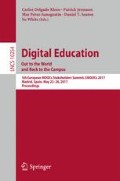Abstract
This paper proposes a method based on the Dominance-based Rough Set Approach (DRSA) to predict the learners who are likely to drop out the course during the next week of the MOOC (Massive Open Online Course) based on their demographic and dynamic data of the previous week. These are called “At-risk Learners”. This method consists in two phases: the first aims at inferring a preference model while the second consists of classifying each learner either in the decision class Cl1 of “At-risk Learners” or in the decision class Cl2 of “Active Learners” based on the previously inferred preference model. The first phase is made of three steps: the first is to identify assignment examples of learners, the second is to construct a coherent criteria family for the learners’ profiles characterization and the third is to infer a preference model resulting in a set of decision rules. The two phases should be weekly implemented throughout the MOOC broadcast. This method has been validated on real data of a French MOOC proposed by a Business School in France.
Access this chapter
Tax calculation will be finalised at checkout
Purchases are for personal use only
References
Balakrishnan, G.: Predicting student retention in massive open online courses using hidden markov models (Technical report No. UCB/EECS-2013-109). University of California at Berkeley, May 2013. http://www.eecs.berkeley.edu/Pubs/TechRpts/2013/EECS-2013-109.html
Bouzayane, S., Saad, I.: A preference ordered classification to leader learners identification in a MOOC. J. Dec. Syst. 26(2), 189–202 (2016). http://dx.doi.org/10.1080/12460125.2017.1252233
Bouzayane, S., Saad, I.: Prediction method based DRSA to improve the individual knowledge appropriation in a collaborative learning environment: case of MOOCs. In: Proceedings of the 50th Hawaii International Conference on System Sciences, pp. 124–133, January 2017
Bouzayane, S., Saad, I.: Multicriteria decision aid approach to “referent learners” identification within a MOOC. In: EMOOCs-2016, Research Track, pp. 237–250 (2016)
Chaplot, D., Rhim, E., Kim, J.: Predicting student attrition in MOOCs using sentiment analysis and neural networks. In: Proceedings of AIED 2015 Fourth Workshop on Intelligent Support for Learning in Groups (2015)
Greco, S., Matarazzo, B., Slowinski, R.: Rough sets theory for multicriteria decision analysis. Eur. J. Oper. Res. 129, 1–47 (2001)
Hone, K.S., El Said, G.R.: Exploring the factors affecting MOOC retention: a survey study. Comput. Educ. 98, 157–168 (2016). doi:10.1016/j.compedu.2016.03.016
Moon, S., Potdar, S., Martin, L.: Identifying student leaders from MOOC discussion forums thorugh language influence. In: Proceedings of the 2014 Conference on Empirical Methods in Natural Language Processing (EMNLP), pp. 15–20 (2014)
North, S.M., Ronny, R., Max, M.: To adapt MOOCs, or not? That is no longer the question. Univ. J. Educ. Res. 2(1), 69–72 (2014)
Pawlak, Z.: Rough sets theory for multicriteria decision analysis. Int. J. Comput. Sci. 11, 341–356 (1992)
Roy, B., Mousseau, V.: A theoretical framework for analyzing the notion of relative importance of criteria. J. Multi-Criteria Dec. Anal. 5, 145–159 (1996)
Xing, W., Chen, X., Stein, J., Marcinkowski, M.: Temporal predication of dropouts in MOOCs: reaching the low hanging fruit through stacking generalization. Comput. Hum. Behav. 58, 119–129 (2016)
Yang, D., Sinha, T., Adamson, D., Rose, C.P.: Turn on, tune in, drop out: anticipating student dropouts in massive open online courses. In: NIPS Workshop on Data Driven Education (2013)
Yuan, L., Powell, S.: MOOCs and disruptive innovation: implications for higher education. eLearn. Pap. in-depth 33, 1–7 (2013)
Author information
Authors and Affiliations
Corresponding author
Editor information
Editors and Affiliations
Rights and permissions
Copyright information
© 2017 Springer International Publishing AG
About this paper
Cite this paper
Bouzayane, S., Saad, I. (2017). Weekly Predicting the At-Risk MOOC Learners Using Dominance-Based Rough Set Approach. In: Delgado Kloos, C., Jermann, P., Pérez-Sanagustín, M., Seaton, D., White, S. (eds) Digital Education: Out to the World and Back to the Campus. EMOOCs 2017. Lecture Notes in Computer Science(), vol 10254. Springer, Cham. https://doi.org/10.1007/978-3-319-59044-8_18
Download citation
DOI: https://doi.org/10.1007/978-3-319-59044-8_18
Published:
Publisher Name: Springer, Cham
Print ISBN: 978-3-319-59043-1
Online ISBN: 978-3-319-59044-8
eBook Packages: Computer ScienceComputer Science (R0)

